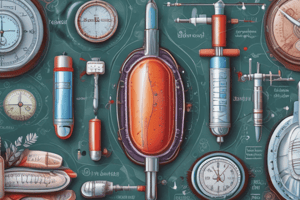Podcast
Questions and Answers
Which type of diabetes accounts for 10% of cases?
Which type of diabetes accounts for 10% of cases?
- Gestational diabetes
- Diabetes insipidus
- Type 2 diabetes
- Type 1 diabetes (correct)
What is the role of beta cells in the pancreas?
What is the role of beta cells in the pancreas?
- Carry nutrients
- Regulate blood glucose
- Secrete insulin (correct)
- Secrete glucagon
What is the criteria for diagnosing diabetes according to the American Diabetes Association?
What is the criteria for diagnosing diabetes according to the American Diabetes Association?
- Both A1c > 6.5% and Fasting Glucose > 126 mg/dL (correct)
- Fasting Glucose > 126 mg/dL
- A1c > 6.5%
- Neither A1c > 6.5% nor Fasting Glucose > 126 mg/dL
Which type of diabetes always requires insulin?
Which type of diabetes always requires insulin?
Which type of insulin formulation is appropriate for acute management of conditions like DKA and HHS?
Which type of insulin formulation is appropriate for acute management of conditions like DKA and HHS?
Which type of insulin has the longest duration of action?
Which type of insulin has the longest duration of action?
What is the definition of hypoglycemia?
What is the definition of hypoglycemia?
Match the following key players in diabetes with their primary roles:
Match the following key players in diabetes with their primary roles:
Match the following types of diabetes with their corresponding percentage of cases:
Match the following types of diabetes with their corresponding percentage of cases:
Match the following criteria for diagnosing diabetes with their corresponding definitions:
Match the following criteria for diagnosing diabetes with their corresponding definitions:
Match the following types of insulin with their correct descriptions:
Match the following types of insulin with their correct descriptions:
Match the following symptoms with the correct type of diabetes:
Match the following symptoms with the correct type of diabetes:
Match the following blood glucose levels with their corresponding conditions:
Match the following blood glucose levels with their corresponding conditions:
Match the following terms with their correct definitions:
Match the following terms with their correct definitions:
True or false: Diabetes insipidus is a type of diabetes mellitus.
True or false: Diabetes insipidus is a type of diabetes mellitus.
True or false: Type 1 diabetes is characterized by insulin resistance.
True or false: Type 1 diabetes is characterized by insulin resistance.
True or false: Oral drugs are currently approved to treat type 1 diabetes.
True or false: Oral drugs are currently approved to treat type 1 diabetes.
True or false: Patients with Type 2 Diabetes may initially report no symptoms.
True or false: Patients with Type 2 Diabetes may initially report no symptoms.
True or false: Insulin is always needed in Type 1 Diabetes.
True or false: Insulin is always needed in Type 1 Diabetes.
True or false: Rapid-acting insulin has an onset of 15 minutes or less.
True or false: Rapid-acting insulin has an onset of 15 minutes or less.
True or false: Hypoglycemia is defined as a blood glucose level below 70 mg/dL.
True or false: Hypoglycemia is defined as a blood glucose level below 70 mg/dL.
Which of the following is true about Type 1 Diabetes?
Which of the following is true about Type 1 Diabetes?
What is the primary role of the pancreas in regulating blood glucose?
What is the primary role of the pancreas in regulating blood glucose?
What is the criteria for diagnosing diabetes according to the American Diabetes Association?
What is the criteria for diagnosing diabetes according to the American Diabetes Association?
Which type of diabetes is characterized by the pancreas releasing insulin throughout the day at a controlled amount and sharply increasing insulin release after meals?
Which type of diabetes is characterized by the pancreas releasing insulin throughout the day at a controlled amount and sharply increasing insulin release after meals?
Which of the following symptoms are consistent with Type 2 Diabetes?
Which of the following symptoms are consistent with Type 2 Diabetes?
Which type of insulin formulation is appropriate for acute management of conditions like Diabetic Ketoacidosis (DKA) and Hyperosmolar Hyperglycemic State (HHS)?
Which type of insulin formulation is appropriate for acute management of conditions like Diabetic Ketoacidosis (DKA) and Hyperosmolar Hyperglycemic State (HHS)?
What is the definition of hypoglycemia?
What is the definition of hypoglycemia?
Flashcards are hidden until you start studying
Study Notes
Diabetes Overview
- Type 1 Diabetes: 10% of cases, autoimmune, and insulin-dependent
- Type 2 Diabetes: 90% of cases, insulin resistance
- Diabetes criteria: A1c > or = 6.5%, Fasting Glucose > 126 mg/dL, or OGTT > 200 mg/dL (2 hours after sugary drink)
Insulin Therapy
- Always needed in Type 1 Diabetes
- Sometimes needed in Type 2 Diabetes (up to 1/3 of the time)
- Insulin therapy aims to mimic normal pancreatic function: basal dose in the morning and pre-meal bolus dose to offset post-prandial blood glucose rises
Insulin Types
- Rapid-Acting Insulin: Aspart (NovoLOG), Lispro (HumaLOG), Glulisine (Apidra)
- Onset: 15 minutes or less
- Duration: 4-8 hours
- Used for post-prandial hyperglycemia
- Short-Acting Insulin (Regular Insulin)
- Onset: 30 minutes - 1 hour
- Duration: 5-7 hours
- Can be given IV for acute management of DKA, HHS, and acute hyperkalemia
- Intermediate-Acting Insulin (NPH)
- Onset: 1-1.5 hours
- Peak: 8-12 hours
- Duration: 18-24 hours
- Long-Acting Insulin (Glargine, Detemir)
- Onset: 1 hour
- Duration: up to 24 hours
- Used for basal dosing
Hypoglycemia
- Defined as blood glucose < 70 mg/dL
- Can occur with rapid correction of blood glucose
- Symptoms: altered mental status, agitation
- Treatment: rapidly absorbed carbohydrates, glucose products, or glucagon (if unconscious)
Other Key Points
- Pancreas produces insulin and glucagon
- Fat cells can contribute to insulin resistance
- Red blood cells carry nutrients and potassium
- Liver and kidneys play a role in pharmacokinetics and gluconeogenesis/lysis
Studying That Suits You
Use AI to generate personalized quizzes and flashcards to suit your learning preferences.




